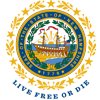Hunting on State Lands FAQs
Clearing up Confusion Regarding Hunting on State-Owned Land
Relative to lands under the jurisdiction of the NH Departments of Natural and Cultural Resources (DNCR), Fish and Game, and the Department of Environmental Services (DES) Water Division.
How are inquiries or complaints about hunting on state lands handled?
The procedure is described in "GUIDELINES FOR CALLER RESPONSE - About Hunting on State-owned Lands," available at the New Hampshire Division of Forests and Lands website.
What is a compact zone and who determines if a property falls within a compact zone?
The discharge of firearms is illegal within "compact zones" defined by RSA 644:13 as any place where six or more residences are each within 300 feet of another; includes a 300-foot perimeter around all of the buildings.
Some state lands fall within these zones. Each individual has a responsibility to know where compact zones exist to comply with the law. A law enforcement officer can make an on-site determination if there are any questions.
Hunters are advised to check with city or town officials regarding local ordinances that may govern the discharge of firearms.
Can we recreate on state lands during hunting season?
Hunting should not conflict with other activities normally occurring on state properties. Hunters and non-hunters have responsibility to share public lands with care. The most important precaution is to wear "hunter orange" or other bright fluorescent colors such as reds and yellows. Safety is everyone's responsibility and common sense precautions are in order.
Are deer stands allowed on state lands?
Permanent tree stands or structures are not allowed on state lands. Portable tree stands are allowed on state lands, for the purpose of hunting, only between August 1 and January 31, providing:
- no nails or other devices are inserted into a tree;
- the stand can be removed without damage to any vegetation;
- no vegetation is removed or cut for visibility or concealment.
All tree stands left after January 31 will be subject to removal. On DNCR-owned state property, tree stands will be removed during active timber harvest operations; DNCR will not be held liable or responsible for loss or damage of tree stands removed for this purpose.
Is game baited on state lands?
Baiting wildlife is permitted on some listed State lands, by permit only. Baiting permits are issued by Fish and Game. For a complete list of permissible lands, contact the Wildlife Division at Fish and Game headquarters, call (603) 271-2461.
Am I allowed to use dogs to hunt on state lands?
Taking bear with dogs is not allowed on State Parks managed by the Division of Parks and Recreation; it is allowed on other forest lands managed by other agencies. Rules and regulations pertaining to taking any wildlife species with dogs must be followed. There are also rules and regulations pertaining to training dogs for hunting on state lands.
Questions concerning either hunting with dogs or training dogs for hunting should be directed to Law Enforcement Division of the Fish and Game Department, call (603) 271-3127.
Do I need permission to hunt on state land? To cross private land to get to state land to hunt?
Each state-owned forest land is open to hunting unless otherwise posted. It is a courtesy to contact private landowners to cross or use their land if not otherwise posted.
Who do I contact about hunting on state lands?
The Fish and Game Department is responsible for the regulation of hunting on all public and private lands. For questions about hunting regulations on state-owned lands, Fish and Game or the local Conservation Officer should be contacted. Fish and Game call (603) 271-3127.
If I have a question about a particular property, whom do I call?
Questions about specific properties should be answered by the agency that is the primary property manager.
Who manages state-owned land?
State agencies take the management lead on properties assigned to them. Forests and Lands, Parks and Recreation, Natural Heritage Inventory, Fish and Game, Historic Preservation, Dept. of Environmental Services, and Dept. of Transportation combine staff and other resources to cooperatively manage lands under each agency's jurisdiction.
Who is responsible for managing wildlife on state-owned lands?
The New Hampshire Fish and Game Department is legislatively designated to manage wildlife.
By cooperative agreement, Fish and Game works with other agencies assigned land management responsibilities to carryout projects of mutual interest to improve wildlife habitat, forest recreation, and forestry operations for public use and benefit.
Is hunting allowed on state-owned lands?
Hunting is allowed on state lands unless otherwise posted or prohibited by law. A small percentage of state lands are closed to hunting
Are there any state-owned forest lands where hunting is not allowed?
Hunting is not allowed at all DNCR state historic sites, Urban Forestry Center in Portsmouth, Odiorne Point State Park in Rye (east side of Route 1A only - the west side of Route 1A is open to hunting), Shieling State Forest in Peterborough, Opeechee Bay State Forest in Laconia, and Pondicherry Wildlife Refuge in Jefferson.
How much state land is there? How do I get there? Where can I get a map?
DNCR, Fish and Game, and DES collectively manage more than 200 state forests, parks, wildlife management areas, and flood control areas totaling over 200,000 acres.
State highway maps available through DNCR show the location of most major state parks and forests. Individual state park maps for many of the state parks are also available through DNCR. USGS topographical maps are available at most bookstores and typically show public land boundaries.



